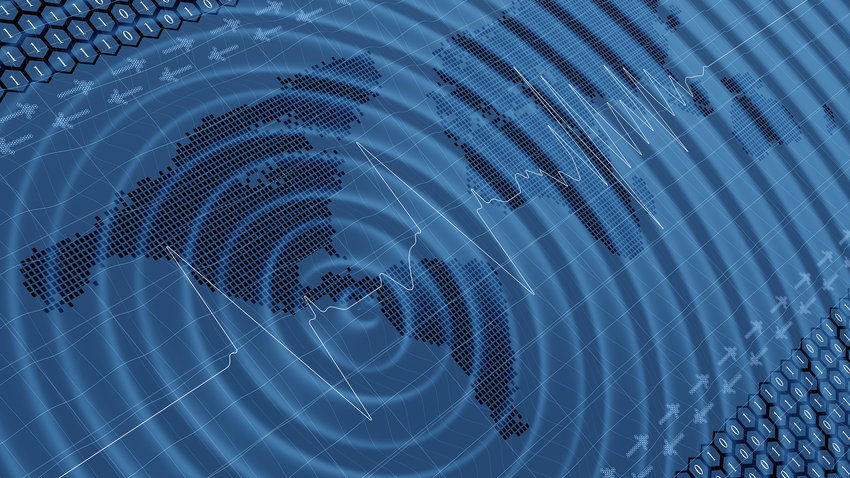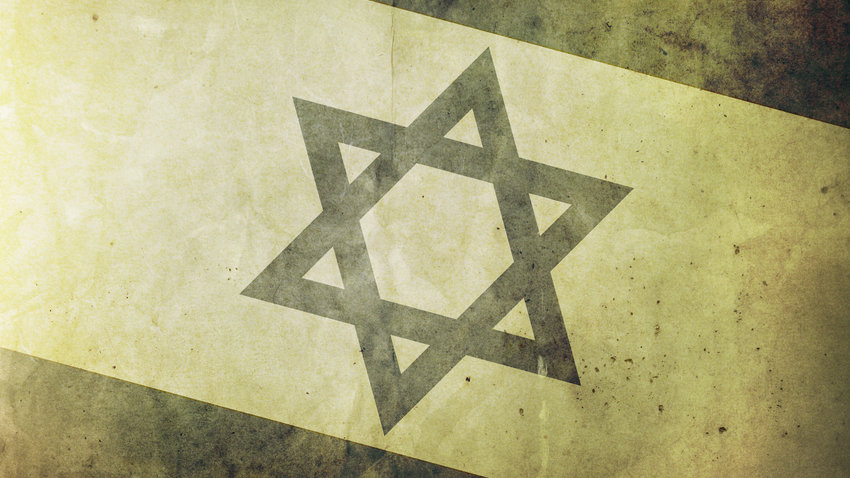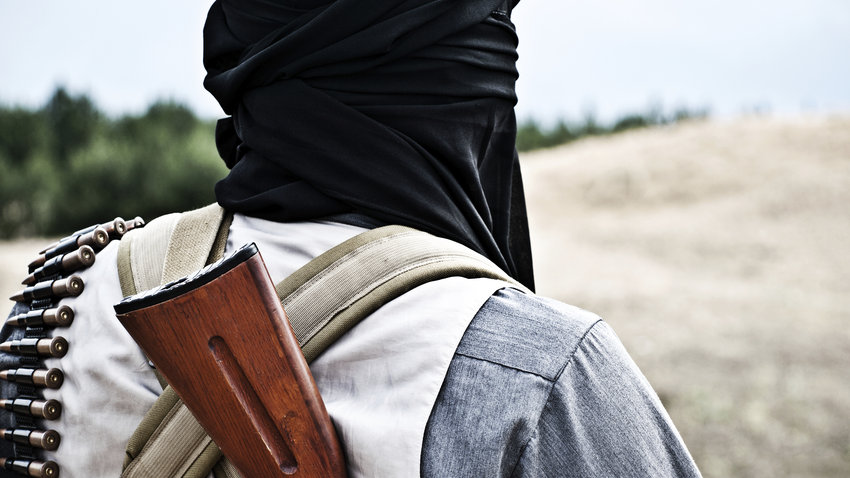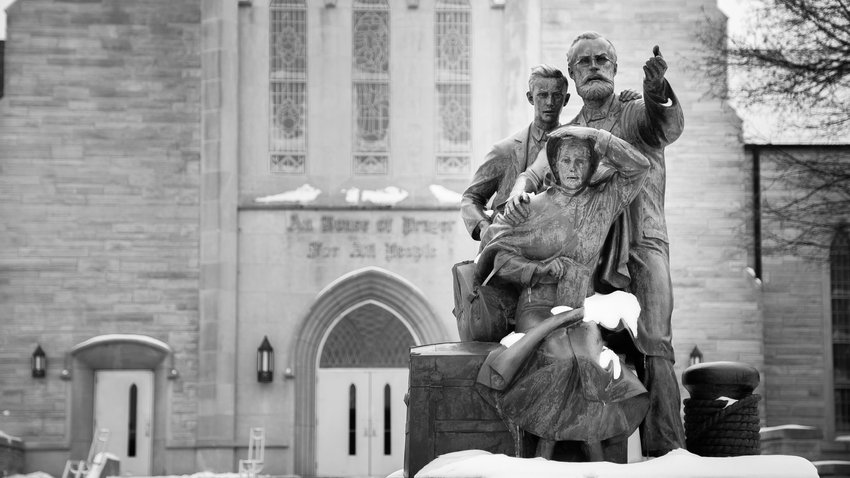In front of this church where graduation exercises transpire stands a bronze statue of the university namesake, John Nevins Andrews. The skilled work of sculptor Allan Collins, this replica of the Seventh-day Adventist church’s first scholar and missionary is shaped with extended arm and hand pointing outward to a world beyond the church. For years now pinned to the wall of my study is this quotation from J. N. Andrews: “I know of but one way: find a field of labor, ask God to help, take off your coat, and pitch into the work.” What is compelling about his personal mission statement is its tacit recognition that most of life (if not all of it) is simply a series of personal choices that reflect opinions and aspirations that are uniquely yours. What someone else considers a fantastic opportunity for career fulfillment or professional advancement might to you seem pedestrian and unappealing. Conversely, an opportunity others might declare unimaginative or so-dead-end might in fact be the high voltage that ignites your imagination and compels you to go. But where does God want me to go? Note carefully the sequence in Andrews’ lifework mantra: first, you find a place on earth where a great need matches your life quest; then ask the God who has already gifted you to help you serve Him there (in that village, that city, that wherever). But is that modus operandi the way God really operates? It’s precisely what He promised a new leader on graduation day long ago: “‘Have I not commanded you? Be strong and of good courage; do not be afraid, nor be dismayed, for the LORD your God is with you wherever you go’” (Joshua 1:9 emphasis supplied). When God promises “wherever you go,” He means—“you choose, I bless . . . you go, I accompany.” Stunning, isn’t it? Andrews was right. I.e., you pick the opportunity, you choose the field—and then asking God to help you, you pitch in to alleviate the human need in front of you. The graduate who spends her days calculating her move and choreographing her future will be of little help in a world so desperately in need right now. So as you march out of this church for the last time, do yourself and God a favor. Glance one more time at the statue. It still speaks. And its hand is still pointing you to the way.
Pastors' Blog
By Pioneer Pastors

On April 29, 1865, 50,000 people stood in line to pass through the Ohio Statehouse rotunda to pay their last respects to the recently slain Abraham Lincoln. As America mourned the assassination of its President, Ohioans reflected the gratitude of this country in that outpouring of affection. Hanging overhead in the Statehouse was a banner with an excerpt from Lincoln’s second inaugural address: “With malice toward none, with charity for all.” To commemorate the 150th anniversary of his death, the Statehouse in Ohio today has hung a replica banner high overheard for all to read: “With malice to no one, with charity for all.” It is an admirable sentiment, but as you quickly note it is not the correct rendition of the line President Lincoln spoke in that address. But if you were to call the Ohio Statehouse and protest this inaccurate quotation, they would be quick to inform you that in fact the words on the banner are “historically faithful to the one hung on the building on April 29, 1865” (South Bend Tribune 4-22-15). As it turns out the creators of the original banner 150 years ago got it wrong—and with no Google to fact check their quotation, they hung up an inaccurate rendition of (what would become) Lincoln’s immortal line! Do you suppose this has something to do with “the sin of the parents” being passed down “to the third and fourth generation” (Exodus 20:5)? Probably not what God had in mind. But the truth is, it really isn’t that difficult—is it?—to repeat the mistakes of those who have gone before us. Honest-hearted mistakes, to be sure, but mistakes nevertheless that we unintentionally pass on to the those who watch us, who become behind us—mistakes they in turn honest-heartedly repeat. Children are renowned for their uncanny ability to mimic our behavior. When I get it right, they get it right—when I get it wrong—oops!—they get it wrong. That may be closer to what God had in mind in the 2nd Commandment of His Decalogue. Perhaps Michael Horton, in his new book Ordinary, has something to teach us: “If staying with the familiar (no matter how bad it may be) is the tendency of a conservative temperament, the ideal of creativity and novelty—as an end it itself—becomes destructive of long conversations. At the end of a term a student discovered the professor’s evaluation explaining the poor grade: ‘Your paper is original and creative. The parts that are creative are not original and the parts that are original are not very good.’” Horton concludes: “The best changes are slow, incremental, and deliberate. Instead of cutting their own path, they extend the ancient faith into the next generation” (Ordinary 64-65). Extending the ancient faith into the next generation—that is the mission of both the Christian academy and the church. To the extent we do it faithfully and we do it well here at Pioneer and Andrews, may God be blessed and His Kingdom on earth expanded. The campus-wide Day of Prayer that the university administration has called for this coming Monday is a collective/corporate opportunity for us to join our minds and hearts and blend our intercessions on behalf of this institution we love and serve. In the words of the ancient prophet: “I have heard all about you, LORD, and I am filled with awe by the amazing things you have done. In this time of our deep need, begin again to help us, as you did in years gone by. Show us your power to save us. And in your anger, remember your mercy” (Habakkuk 3:2 NLT). And so we pray.

Here’s a cheerful thought on this sunshiny Tax Day. According to the website usgovernmentrevenue.com, the governments (plural) of the United States will collect $6 trillion in revenue in 2015—$3.2 trillion for the federal government, $1.6 trillion for state governments, and $1.2 trillion for local governments. Those taxes will include income tax, social security tax, sales tax, along with fees and charges and other revenue. For a total of $6 trillion. Do you know how much that is? Neither do I. But here’s a graphic to tuck away in your mind: if you took a one hundred dollar bill and taped it end to end with another hundred dollar bill and kept doing that, how long would the taped hundred dollar bills need to be in order to have $1 trillion worth? You would need to circle the earth with $100 bills—are you ready for this?—41 times in order to have $1 trillion! Make that 246 times around the earth with hundred dollar bills in order to have $6 trillion, the annual revenue for the governments of this nation! (And be assured, the $6 trillion gets spent as fast as it is raised.) Wasn’t it Jesus who declared, “Render to Caesar what is Caesar’s and to God what is God’s” (Matthew 22:21). Just between you and me it appears Caesar is making off like a bandit. Unfortunately, for God the numbers aren’t quite as encouraging. Not that God needs our taxes. “‘The silver is Mine, and the gold is Mine,’ says the LORD of hosts” (Haggai 2:8). And if Google is to be believed, that would be 1.4 million tons of silver (that’s ever been mined) and 170,000 tons of gold (ditto). At today’s market prices that comes to approximately $6.5+ trillion in precious metals. But then we remember that God also owns the entire planet, shooting His real estate holdings through the roof. He also owns the solar system. And also the Milky Way galaxy. And also the universe of a billion billion galaxies. Conclusion: He doesn’t need our taxes. Or even our tithes. After all, what are my nickels and dimes in comparison to His title deed to the entire universe! And yet, God invites you and me: “‘Bring the whole tithe into the storehouse, that there may be food in My house. Test me in this,’ says the LORD Almighty, ‘and see if I will not throw open the floodgates of heaven and pour out so much blessing that you will not have room enough for it’” (Malachi 3:10). Apparently, tithes and offerings are more about me than they are about Him. Because if He doesn’t need them, it must be that I do. Must be that enlisting God to be my personal Chief Financial Officer is all about my trusting Him to take care of me, no matter what it looks or feels like at the time. Must also be that returning to Him 10% of my income and giving offerings as He blesses me is simply an expression of my gratitude for God’s continual care and my request for His wise 24/7 management of my life. And on top of it all He offers this stunning bottom-line: “I will throw open the floodgates of heaven and bless you so much you won’t have room for it all!” So why not take God up on His incredible offer? If you’d like to partner with Him electronically, download our free app SecureGive from your app store. It’s private, secure and as easy as 1-2-3. With the app you can return your tithe to God or give an offering to Pioneer 24/7 anywhere on earth. Look—Caesar has our taxes, but God has our lives—and I say let’s keep it that way.

Our Jewish friends and neighbors are celebrating Passover this week—from the sundown that welcomed Sabbath (April 4) to the sundown that concludes Sabbath (April 11). Included in their festivities will be the solemn but joyous celebration of the Seder. Replete with candles, the unleavened matzah bread, the maror bitter herbs, and a sumptuous dinner, this annual ritual Seder gathering of family and friends around the supper table is unlike any other Jewish celebration. And of course it is for them a powerful, emotive reminder of God’s epic midnight deliverance of the children of Israel from Egypt long ago. The Passover Seder’s fifteen steps—from the opening Kadesh to the concluding Hallel and Nirtzah—not only serve as a symbolic union with the ancient faith community, but also as a collective expression of hope that God will even yet bring ultimate deliverance for His children scattered across the earth. As one Seder website testifies: “We recognize that despite our freedom we still live in a fractured world where things are less than perfect. We hope, dream and sing of a world redeemed as we conclude this year’s Seder, and commit ourselves to being part of this unfolding narrative” (http://www.aish.com/h/pes/t/si/The-Passover-Seders-15-Steps.html?s=show&tab=y). I like that—“We hope, dream and sing of a world redeemed . . . and commit ourselves to being part of this unfolding narrative.” Don’t we all—Jews, Christians, Seventh-day Adventists alike? “For whenever you eat this bread and drink this cup, you proclaim the Lord’s death until he comes” (1 Corinthians 11:26). So wrote the rabbi and apostle Paul. But I’m not thinking of the ritual meal (whether it is the Seder or the Lord’s Supper). I wonder instead about the hope that the meal is intended to nourish, the hope of the yet-to-come Exodus deliverance of the people of God at the Second Coming of Christ. How vibrant is that adventist hope these days? The hotly contested nuclear accord with Iran, the Islamic State meltdown in the heart of the Middle East may distract us from the chronic entropy with which the rest of the planet struggles—the leakage of economies large and small, a crumbling of moral foundations, the demise of genuine social progress or even spiritual hope. The hype of our entertainment and sports frenzy notwithstanding, there is a collective, almost palpable longing for some Moses figure to rise up and shepherd this broken civilization toward healing. From my humble perspective we really can get there from here, without a multiplication of complex moves. In fact just a short step lies between here and there. But before we get there, there is this promise: “‘ . . . and I will bring judgment on all the gods of Egypt. I am the LORD. The blood will be a sign for you on the houses where you are; and when I see the blood, I will pass over you’” (Exodus 12:12-13). In the final Exodus, those who are passed over (i.e., delivered by the Almighty) are those who take refuge “under the blood,” the scarlet sign of the Lamb of God. That the Pharaoh’s of earth will refuse the blood is obvious. But not all citizens will share that rejection. The Exodus narrative declares, “Many other people [Egyptians] went up with them [the children of Israel]” (Exodus 12:38). In that midnight neighbors, acquaintances, even strangers turned to the God of the Israelites, seeking refuge with them “under the blood,” thus inheriting with them the promise of the Promised Land. Evangelism isn’t an obsolete program of the church. As in the Exodus, it is the opening of our homes and hearts to millions who will yet find in Christ the only Deliverer from a disintegrating world. And the good news is they live next door.

The Wall Street Journal this week reported the story of Sandra Ladra of Prague, Oklahoma. She was sitting in a recliner at home when the earthquake struck. As she describes it, the ground shook, her chandeliers “swung wildly” and the stone chimney in her house disintegrated, sending blocks through her roof and onto her legs. “‘I was screaming. I was trying to keep the blocks from hitting me’ said Ms. Ladra, 64 years old. Her home suffered more than $100,000 in damages, and a doctor says she needs surgery, she said.” Turns out it was a 5.6-magnitude quake, the strongest ever recorded in Oklahoma. (http://www.wsj.com/articles/frackings-new-legal-threat-earthquake-suits-1427736148) But it also turns out that officials of the Oklahoma Geological Society first suggested that the earthquake was the result of nearby oil and gas drilling, but later rescinded that decision and declared that quake to be from natural causes. Ms. Ladra isn’t buying their change of opinion. Her suit links her injuries and damage to fracking, an oil or gas drilling procedure “which involves shooting a slurry of water, sand and chemicals into wells to let oil and gas flow out.” Although in fact researchers now suggest that “the most serious seismic risk comes from a separate process: disposal of toxic fluids left over from fracking and drilling by putting it in wells deep underground. Geologists concluded decades ago that injecting fluid into a geologic fault can lubricate giant slabs of rock, causing them to slip. Scientists say disposal wells are sometimes bored into unmapped faults. The practice isn't new, but has proliferated with the U.S. drilling boom.” (Ibid) So Sandra Ladra is suing the giant energy conglomerates for the earthquake that caused her injuries. Given the global extent of fracking and drilling, you can understand the keen interest with which the oil and gas industry is watching this court battle. So who gets sued for the explosive earthquake that shook Jerusalem early Easter Sunday? “There was a violent earthquake, for an angel of the Lord came down from heaven and, going to the tomb, rolled back the stone and sat on it” (Mt 28:2). Have you noticed? An earthquake when He died, an earthquake when He arose, and an earthquake when He returns—you get the impression that Christ is the Lord of unbridled power, don’t you? Truth is, His enemies could have piled a thousand Mt Everests on top of His garden tomb—but it would have made no difference! Not even death could pin Him to the sepulcher. But maybe what has you pinned under the rubble right now isn’t death. Perhaps it’s debt . . . divorce . . . despair . . . or debilitating illness, fear, failure or loneliness. God knows all the enemy crumbles on top of us. Which is why—not only on Easter but for every day and night still ahead of us—we need to keep hearing that mighty cry when Jesus came striding out of that quake-shattered crypt and declared over the pre-dawn rubble, “I am the resurrection and the life!” It was indisputable then—it is so now. Death and even life may bury us—but in the power of the risen Savior we can still be resurrected. Sue Him? Never. Worship Him forever and ever. Amen.

Maybe it’s because I just returned from a week-long preaching mission (nine sermons) in Serbia—that land torn by the pincers of war through much of its recent history. Or perhaps it was this week’s reporting on the 70th anniversary of the Battle for Iwo Jima, the site of one of World War 2’s bloodiest onslaughts and the setting for the iconic picture of U.S. Marines hoisting their wind-whipped American flag atop Mt Suribachi. Whatever the reason, I must confess that in reading the opening line to Daniel 10 today, the phrase “a great war” instantly caught my attention and triggered a brooding chain of thoughts. Can you think of a more accurate defining of our times than “a great war”? It’s what we do for a living (and dying) any more on this planet! I get headline text alerts from CNN on my phone, and almost daily come soundbite reports of another mosque or church or school or marketplace or museum suicide bombing somewhere on earth (though usually from the warring heart of the Middle East). Yemen, Tunisia, Pakistan, Afghanistan, Syria, Iraq, Israel—the roll-call of terrorized nations is too lengthy to enumerate. Sydney, Paris, London—even in the West we know the war of terror. “A revelation was given to Daniel—its message was true and it concerned a great war” (Daniel 10:1). The eighty year old exile, prime minister and prophet was so troubled by recent events in his world that he devoted 21 days to modified fasting and concentrated praying. And at the end of three weeks, that aged one, called by Heaven “greatly beloved,” experienced a stunning personal visitation by the pre-incarnate Christ and His trusted angel messenger Gabriel. And from the conversation that ensues (albeit dominantly one- and God-sided), the veil between us and the unseen world lifts briefly—and we gaze upon beings, celestial armies, forces of light and darkness desperately locked in battle for human allegiance. Daniel, burdened for the salvation of his people, is shown “a great war” in the highest echelons of humanity—a spiritual battle directed by the Almighty Himself to preserve a people, a movement targeted by the dark enemy for annihilation. Will evil triumph over righteousness, will the community of faith be decimated by him who seeks only our destruction? Live on this campus, live in the world, and it is more than evident the maelstrom of this “great war” surrounds us, too. Forces we know very little about have marked for eradication the spiritual values we embrace. Cloaked behind innocuous symbols like cupcakes and lollipops, it is marketing ploy as old as Eden—insinuations of doubt, whisperings of falsehoods, and the unsubtle targeting of innocents who struggle to understand the values and morality of Christ against the crescendoing drumbeat of a culture that tolerates no contrarian values and brooks no courageous opposition. “A great war” indeed—and Daniel and you and me. And the forces. Where shall we stand? I like the way my friend, Dr Skip MacCarty, has defined his stance, and I’d like you to read it prayerfully, too (though it may be a bit more explicit than you’re used to). But because his point is so logically, compassionately and persuasively made, I believe it deserves a very far and wide hearing. So please—read it, post it and retweet it (https://www.facebook.com/skip.maccarty/posts/10153167969416419). Why not take a stand in this “great war,” even as he has done? After all, “Dare to Be a Daniel” has got to be more than a childhood song. It’s the one stance you’ll be able to live with for eternity. And isn’t eternity the highest stake of all in this “great war”?

I guess we shouldn’t have been surprised that last Sabbath afternoon’s panel/audience conversation about race relations in the Seventh-day Adventist church in America was a standing-room only event (here at Andrews University). The conversation was candid, but the spirit that prevailed was both healthy and essential to any future change in our national church. What I’m especially proud of, however, is the prayerful, cogent thinking evidenced by the team of Andrews University student leaders who organized the event. Led by Livvy Knott-Ruiz, AU Student Association president this year, this diverse band of young leaders not only effectively facilitated the 2+ hour conversation, they ended the event by sharing with the audience a formal statement they prepared for (and have subsequently delivered to) the administration of the North American Division of Seventh-day Adventists. As a panel member, I had no idea the young leaders had prepared a resolution. But as I read their statement, projected onto the towering wall of Buller Hall, my heart rejoiced in the simple, humble but wise appeal they make. Rather than insert their recommendation to the NAD officers here, please find it at this link (https://www.facebook.com/andrewssa/posts/791148580953919) and carefully, prayerfully read their statement. You may share their recommendation by placing this link on your own Facebook page or retweet the link on Twitter. I’m sure their youthful appeal will be heard not only across this nation, but around the world. And why not? Surely in the economy of God the time has come for Jesus’ last prayer (expressed four times) to be answered: “That they may be one, Father, as We are one” (count those four prayers in John 17). I continue to believe that the young are God’s strategic endtime key (see Psalm 110). With social media as their platform, they are able to effect change on levels we have not seen in the past. But it is clear their interest is not change, simply for the sake of change. Rather, belonging to a world and nation deeply in need of the gospel of justice, equality and compassionate humanitarian intervention, the young of the church are willing to bend their minds, their energies and immerse their lives in seeking to bring healing change to both the church and the world. To that end the young need our prayers, deserve our example, and will flourish with our personal support and encouragement. Thank you for the way you affirm the young disciples of Jesus in your life and community, for your willingness to journey alongside of them in this critical chapter of earth history.

The flap this week over Israel’s prime minister, Benjamin Netanyahu (whom I bumped into once in a department store in Helsinki, Finland—albeit at a secure distance), addressing the U.S. Congress without the invitation or approval of President Obama is no doubt more about personal chemistry than political protocol. But it certainly has raised among the chattering class the question of this nation’s historic ties to Israel. A decade ago Left Behind, the bestselling fictional series by Tim LaHaye and Jerry Jenkins, popularized the evangelical notion that modern Israel is prophetically destined to be a critical player in God’s endgame for this civilization. LaHaye, himself a minister, built his case (as numerous evangelical scholars have done) on the premise that God’s ancient predictions regarding Israel (in Isaiah, Jeremiah and the Old Testament prophets) were intended to remain literal prophecies to be fulfilled through the nation of Israel today. Thus LaHaye announced the hand of God in the formation of the state of Israel (1948), the recapture of Jerusalem, and an eventual rebuilding of the Jerusalem temple and conversion of Jews in Israel at the time of Christ’s return. This evangelical interpretation of Old Testament prophecy strongly undergirds the political support Israel enjoys particularly among Republicans. As Seventh-day Adventists we reject the interpretation that divine prophecies, including those concerning Israel in the Old Testament, must have an eventual literal fulfillment in earth history. Rather we embrace the Bible teaching of conditional prophecy, as God explained it: “‘If at any time I announce that a nation or kingdom is to be uprooted, torn down and destroyed, and if that nation I warned repents of its evil, then I will relent and not inflict on it the disaster I had planned. And if at another time I announce that a nation or kingdom is to be built up and planted, and if it does evil in my sight and does not obey me, then I will reconsider the good I had intended to do for it’” (Jeremiah 18:9, 10). God clearly states that divine blessings upon a people or a nation are contingent upon their response to God. I.e., their destiny is linked to their obedience or disobedience of the principles of God’s Kingdom. Thus we believe that when the leaders of the Jewish nation rejected the repeated overtures of the incarnate God in Christ to return to Him and instead collectively refused to accept the Messiah and manifested their choice through the crucifixion of Jesus and subsequent stoning of Stephen, God radically shifted His mission to reach the world. His strategic base would no longer be the literal nation of Israel, but rather a new spiritual nation no longer bound by borders or genetics—the Christian church, the new “Israel of God” (Galatians 6:16). As Paul wrote:“If you belong to Christ, then you are Abraham’s seed [children of Israel], and heirs according to the promise” (Galatians 3:29). Thus today the U.S. alliance with Israel is not prophetic but rather military and political. For it is the church of Christ, the new and spiritual Israel, that has inherited the prophecies regarding that ancient nation. And as the community of the redeemed, the new Israel is described in prophecy as “a great number that no one could count, from every nation, tribe, people and language” (Revelation 7:9). However—and this is a vital “however”—the Jewish people are still very much beloved by God. Through the millennia they have been the keepers of “the oracles of God” (Romans 3:2). The masses in the time of Jesus joyfully accepted Him (Matthew21:46). Thus the passion of the New Testament is “that they may be saved” (Romans 10:1). Note this prediction made a century ago: “There will be many converted from among the Jews, and these converts will aid in preparing the way of the Lord, and making straight in the desert a highway for our God. Converted Jews are to have an important part to act in the great preparations to be made in the future to receive Christ, our Prince” (Evangelism 579). God very much still has a heart for the children of Israel! And if He does, shouldn’t we also?

That’s the headline of a Wall Street Journal piece last weekend, reporting the startling demise of the family as we know it, not only here in the United States but in Europe and Asia as well. “All around the world today, pre-existing family patterns are being upended by a revolutionary new force: the seemingly unstoppable quest for convenience by adults demanding ever-greater autonomy. . . . Thanks to this revolution, it is perhaps easier than ever before to free oneself from the burdens that would otherwise be imposed by spouses, children, relatives or significant others with whom one shares a hearth” (WSJ February 21-22, 2015, A11). Consider these statistics: • As of 2013 according to the Centers for Disease Control “40% of babies in the U.S. were born outside of marriage.” • The Census Bureau for 2014 estimates that “27% of all children (and 22% of ‘White’ children) lived in a fatherless home.” • A 2011 study reported “just 59% of all American children (and 65% of ‘Anglo’ or non-Hispanic white children) lived with married and biological parents as of 2009.” • In Europe “the probability of marriage before age 50 has been plummeting for European women and men, while the chance for divorce for those who do marry has been soaring.” • In Belgium “the likelihood of a first marriage for a woman of reproductive age is now down to 40%, and the likelihood of divorce is over 50%. This means that in Belgium the odds of getting married and staying married are under one in five.” • In Europe “the proportion of childless 40-something women is one in five for Sweden and Switzerland, and one in four in Italy. In Berlin and in the German city-state of Hamburg, it’s nearly one in three.” • “In Western Europe, nearly one home in three (32%) is already a one-person unit, while in autonomy-prizing Denmark the number exceeds 45%.” • In Japan “about one-sixth of Japanese women in their mid-40s are still single, and about 30% of all women that age are childless. Twenty years hence 38% of all Japanese women in their mid-40s would be childless, and an even higher share—just over 50%—would never have grandchildren.” • South Korea, Singapore, Hong Kong—the statistics mirror those above. • Even in less affluent Muslim-majority societies “a flight from marriage within the Arab world is in process,” indicating “high levels of income and educational attainment are not preconditions for the new family revolution in those spots on the globe it hasn’t reached.” And who will suffer the most in this social revolution? Our children and our aged. The WSJ report concludes: “Our world-wide flight from family constitutes a significant international victory for self-actualization over sacrifice, and might even be said to mark a new chapter in humanity’s conscious pursuit of happiness. But . . . it is far from clear that humanity is prepared to cope with the consequences of its impending family deficit, with [its] increasing independence [from] those traditionally most dependent on others—i.e., the young and the old” (emphasis supplied). A global shift from sacrificing for the sake of others to caring only for one’s self. Must it come to this? The Old Testament ends with this provocative prophecy: “‘See, I will send the prophet Elijah to you before that great and dreadful day of the LORD comes. He will turn the hearts of the parents to their children, and the hearts of the children to their parents’” (Malachi 4:5-6). This prediction of a global movement to repair and restore the family clearly presupposes endtime forces bent on destroying the divine edenic ideal of the nuclear family. The statistics are sobering, but God speaks a “last word” into the crisis. Could you and I become part of that restorative “last word?” Could we by our compassion and proactive care for the young and aged be instrumental in God’s effort to save not only the most vulnerable, but to save the family itself? Clearly, we can’t just sit here and do nothing, can we? So what shall we do?

How many more videoed ISIS murders will the world tolerate? It isn’t a pleasant conversation to have; but the tragic brutality notwithstanding, one can’t help but wonder how horrific the scenes must become before there is a global, collective rising up of the human race to halt the butchery. The extermination of six million Jews during World War 2 began with a handful of murders here, another box-car-full there—but all of it (at least initially) beyond the eye and knowledge of an unsuspecting world. Not so the ISIS brutalities that are carefully, even professionally choreographed so all can witness (albeit after the fact) their bloody reprisals. Twenty-one Egyptian Coptic Christians, purportedly lined up for a mass beheading last week. Forty-five Iraqis reported burned to death in cages this week not unlike the hapless Jordanian air force pilot. And all of it at the hands of a taunting organization of terrorists. I am not advocating a “nuke them all” military strategy to end the cruel mayhem. The sword rarely halts the sword. But with every new ISIS headline, the conviction deepens that some sinister mind is cruelly dragging this race into a raging cauldron—for purposes perhaps not yet entirely clear to us. Will a popular moral leader finally speak up and unite the world in a crusade to obliterate such moral debauchery? But as long as all of this is “over there,” how could any leader, political or moral, effectively mobilize the world community? Must it come “over here” first? What lies ahead for us all? Jesus prophesied a “final sign” of His return: Throughout history His followers have been motivated to seek the fulfillment of this last sign, ostensibly to hasten the return of their Lord. But the ratcheting up of human misery and suffering across the earth is surely fresh impetus to obey Christ’s command. What else but the light of His Gospel could possibly penetrate the moral darkness and heal the crippling pain of hopelessness that far, far too many suffer today? Not only in the Middle East, but in the West as well. “. . . from every quarter of this world of ours comes the cry of sin-stricken hearts for a knowledge of the God of love. Millions upon millions have never so much as heard of God or of His love revealed in Christ. It is their right to receive this knowledge. They have an equal claim with us in the Saviour’s mercy” (Education 262-263). “An equal claim” on Jesus’ mercy—black-robed ISIS executioners are not immune to Calvary’s piercing love, are they? Neither are the sobbing loved ones whose wails rend the air. All have “an equal claim” on the Savior’s mercy. And so to all He sends us. For that reason “Kingdom Growth” is fresh language at Pioneer to express this university congregation’s unrelenting commitment to go into all the world, to send into all the world, to give into all the world. “An equal claim” on the Savior’s mercy. Kingdom Growth. Growing Christ’s kingdom one saved life at a time. Like the pioneers. 2015 and beyond.
- ‹ previous
- 32 of 64
- next ›
